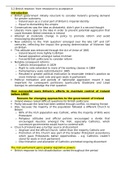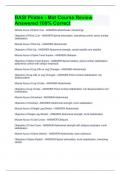3.2 British reaction: from resistance to acceptance
Introduction
British government initially reluctant to consider Ireland’s growing demand
for greater autonomy
o Ireland seen as a crucial part of Britain’s imperial identity
o Equal to dismantling the empire
Conservatives saw the idea as distasteful, didn’t give it a second thought
Liberals more open to the idea in order to prevent potential aggression that
could threaten British interests in Ireland
Attempt at moderate change in policy to promote reform and avoid
encouraging discontent
New solutions to the ‘Irish question’ emerged over the late 18 th and 19th
centuries, reflecting the impact the growing determination of Irishmen had
on Britain
This attitude was enhanced through the Act of Union of 1801
o Ireland bound more tightly to Britain
o Raised opposition amongst native Irishmen
o Forced British politicians to consider reform
Notable consequent reforms
o Catholic emancipation in 1829
o Right to vote extended to more of the working classes in 1884
o Parliamentary seats redistributed in 1885
o Resulted in greater political motivation to reconsider Ireland’s position as
more Irishmen could vote and gain seats in parliament
Political motivation and periods of nationalist aggression meant it was
important for consequent politicians (particularly Gladstone and Lloyd
George) to acknowledge the Irish question
How successful were Britain’s efforts to maintain control of Ireland
before 1885?
Reasons for changing approaches to the government of Ireland
Ireland always raised difficult questions for British politicians
Partly because the land had been settled through conflict, increasing friction
Also, because the majority of the population followed a different Church to
Britain
o 80% of the Irish population was Catholic, while the majority of Brits were
Protestant
o Religious attitudes and official policies encouraged a divide that
encouraged injustice amongst the Irish, especially Catholics, which
successive governments would have to contend with
Church of Ireland was a further source of discontent
o Anglican and the official Church, rather than the majority Catholic one
o Promotion of this Church was part of the broader Protestant ascendancy
which gave Protestants better opportunities – e.g. Catholics couldn’t
stand for seats in Irish parliament
o Discrimination and alienation of Catholics promoted ongoing discontent
The Irish parliament gains greater legislative powers
British response to Irish dissatisfaction varied throughout the period
,3.2 British reaction: from resistance to acceptance
Greatest threat to Britain in the late 18 th century was the American war –
fought to gain American independence from British rule
o Encouraged sympathy amongst Irishmen
o Protestant Irish MPs desired greater political power for the Dublin
parliament – the principles the Americans were fighting for
o British government aware of the potential for further trouble in Ireland
given these parallel
o Defeat of Britain in 1783 sharpened this awareness
War saw demands for the removal of legislative restrictions upon the Irish
parliament that had been imposed by Poynings’ Law (1494) – all Irish
parliamentary decisions subject to the approval of the British parliament
o Declaratory Act of 1720 gave Britain direct legislative powers
o Initial cause of this demand was the reduction in trade due to war and the
clear preference British policy gave to British businessmen at the
expense of the Irish
Immediate issue of trade resolved in favour of Ireland in 1779 – restrictions
on Irish traders abolished
Encouraged greater demand for political freedom for the Irish parliament,
which the Whig government was keen to address
Repealed the Declaratory Act and significantly modified Poynings law in
1782, leaving Britain with only the power of veto
Ireland granted its own Mutiny Act – gave greater control over the armed
forces
Granting these powers meant the Whigs hoped to diffuse the growing
demand for reform so Britain could still retain within the empire – reduce Irish
demands and restore a sense of order to the country
The Catholic Relief Act, 1793
Reforms of the early 1780s were concessions made when Britain was
vulnerable – loss of America damaged confidence and pride causing
willingness to concede reform than risk losing another colony
British policy directed by fears of worse consequences rather than a desire to
improve the experiences of those in Ireland
British government willing to conciliate to the Catholic Committee’s demands
to redress the Penal Laws as they were inspired by the French revolution
o Penal Laws (1695) – a series of laws against Catholics e.g. bans on
holding public office, designed to promote the Church of Ireland
o Pitt content to calm Irish sentiment
o Encouraged the Irish parliament (autonomous but under British influence)
to pass the Relief Act (1793) – removing majority of barriers to Catholics,
minus the right to hold public office
o Motivation was to avoid making Irish Catholics a potential ally for France
as an impending war wished to call Irish troops to support this campaign
o British policy towards Ireland dictated largely by external circumstances
over sympathy
The Act of Union, 1801
Catholic Relief Act didn’t intend to further Irish politic fortunes
Growth of the United Irishmen after 1791 resulted in an attempted uprising in
1798, whilst Britain was preoccupied with war in France
, 3.2 British reaction: from resistance to acceptance
o Hoped Ireland could secure independence using French support against
Britain
o Sought to break British control on Ireland by force of arms
o Failed attempt, devastating for Irish nationalists
o Ireland became bound even more tightly to Britain through the Act of
Union (1801)
Act of Union removed the Irish parliament as the British parliament took
direct control of Irish affairs
Irish representatives permitted 100 seats in British parliament
British politicians reacting to a direct threat using more determined action
o Irish Volunteers and Catholic Committee’s actions were moderate
o United Irishmen’s attempted uprising attempted to encourage revolution
o Empire was fundamental to British identity so when directly challenged,
the government responded decisively to maintain order
Union evidences British determination to maintain a strong Anglo-Irish
relationship, despite growing Irish opposition
United Irishmen uprising seen as a jolt to the British system – necessary to
accept the issues present needed addressing more permanently, minor
reforms insufficient
Pitt failed to allow Catholics to hold public office, leading to his resignation in
March 1801 as he was unable to fulfil his pledge to Ireland
Clear theme of conservative, imperialist, thought surrounding the passage of
the Act of Union
Britain believed Ireland was better off under their rule
Act of Union encouraged further discontent, which was emphasised by
binding Ireland closer to Britain
The Maynooth Grant, 1845
Act of Union intended to subdue Irish discontent by bringing Ireland closer to
Britain via a union where they could enjoy the same privileges as Brits
Expected the Protestant minority in Ireland would be strengthened by the
Protestant majority in Britain
However, it actually generated greater discontent
o Growth of nationalism
o Resentment towards the legislation
Anti-Catholic sentiment common in the country
o Blended with broader, negative, racial attitudes towards the Irish
generally
o Gordon Riots in London (1780) – violent, anti-Catholic protests after
proposals to reduce Catholic discrimination laws
PM Peel sought to improve Catholic and Protestant relations through
concessions that attempted to reduce tensions created by the Repeal
Association – the Maynooth Grant
Proposed to increase government spending on a Catholic seminary (a
training college for priests)
Peel increased funding from £8,000 to £26,000 in 1845, hoping to improve
Irish relations following his government’s recent opposition regarding repeal
(banning Clontarf meeting)
Also hoped to detach moderate Catholics from the repeal movement
Grant actually generated resentment within Britain and amongst Protestants






